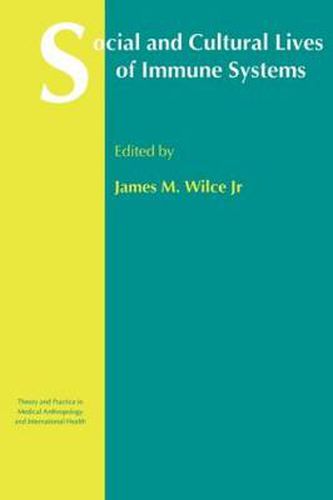Readings Newsletter
Become a Readings Member to make your shopping experience even easier.
Sign in or sign up for free!
You’re not far away from qualifying for FREE standard shipping within Australia
You’ve qualified for FREE standard shipping within Australia
The cart is loading…






Social and Cultural Lives of Immune Systems introduces a provocative new hypothesis in medico-social theory - the theory that immunity and disease are in part socially constituted, and that immune systems function not just as biological entities but also as symbolic concepts charged with political significance. Bridging elements of psychology, sociology, body theory, immunology and medical anthropology, twelve papers from leading scholars explicate some of the health-hazards of emotional and social pressure, whilst analysing the semiotic and social responses to the imagery of immunity. Is it possible, as some experts now claim, that the terminology of immunity, dependent upon the defense of the self from the invasion by an alian other, has entered modern consciousness to a point where it serves as a metaphor and indicator of wider political strategy? Can immunological rhetoric genuinely be shown to affect military operations, crime policy and international food distribution? If this is the case, what conclusions can be drawn from the fact that tactics of disclosure, emotional openness and inclusion are clinically proven to boost immunity, whereas division, denial and containment - apparently modelled on the activities of immune cells - ironically raise susceptibility to disease? Possibly the first cultural analysis of embodiment to give close attention to immune function, and certainly one of the first studies of immunology, disease and healing to look seriously at concepts of the social self, it offers a comprehensive framework for future study in an exciting new area. James Wilce, Roger Booth, Kathryn Davison, Seamus Decker, Barry England, Mark Flinn, Laurence J Kirmayer, Margot Lyon, Samuel J. Mann, Emily Martin, Thom McDade, Daniel Moerman, David Napier, James Pe
$9.00 standard shipping within Australia
FREE standard shipping within Australia for orders over $100.00
Express & International shipping calculated at checkout
Social and Cultural Lives of Immune Systems introduces a provocative new hypothesis in medico-social theory - the theory that immunity and disease are in part socially constituted, and that immune systems function not just as biological entities but also as symbolic concepts charged with political significance. Bridging elements of psychology, sociology, body theory, immunology and medical anthropology, twelve papers from leading scholars explicate some of the health-hazards of emotional and social pressure, whilst analysing the semiotic and social responses to the imagery of immunity. Is it possible, as some experts now claim, that the terminology of immunity, dependent upon the defense of the self from the invasion by an alian other, has entered modern consciousness to a point where it serves as a metaphor and indicator of wider political strategy? Can immunological rhetoric genuinely be shown to affect military operations, crime policy and international food distribution? If this is the case, what conclusions can be drawn from the fact that tactics of disclosure, emotional openness and inclusion are clinically proven to boost immunity, whereas division, denial and containment - apparently modelled on the activities of immune cells - ironically raise susceptibility to disease? Possibly the first cultural analysis of embodiment to give close attention to immune function, and certainly one of the first studies of immunology, disease and healing to look seriously at concepts of the social self, it offers a comprehensive framework for future study in an exciting new area. James Wilce, Roger Booth, Kathryn Davison, Seamus Decker, Barry England, Mark Flinn, Laurence J Kirmayer, Margot Lyon, Samuel J. Mann, Emily Martin, Thom McDade, Daniel Moerman, David Napier, James Pe